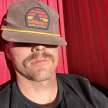Identity Pending
An unlikely-thinking chair

The first time I watched Forrest Gump I was sitting up in a hospital bed fresh out of surgery. I remember being impacted by how Forrest overcame his disability and struggles. Then as an adult, I learned to appreciate the underlying humor in the movie.
Growing up, I was hard on myself, just like any coming-of-age teenager I imagine. But as I got older I learned that not taking myself so seriously was the key to my success.
“I don't know if we each have a destiny, or if we're all just floatin' around accidental-like on a breeze, but I, I think maybe it's both. Maybe both is happenin' at the same time.” -Forrest Gump
By the time I was ten, I was called a loser more times than I ever finished a math assignment. And by the time I was fourteen, I had more surgeries than I had trophies.
I spent more time reflecting on my life in a hospital bed than I did in churches. Despite my persisting ADHD, being confined to a bed forced me to try and be still in the moment, (It’s also possible that was the drugs.) There was an urgent force pressing at me. And as much as I wanted to ignore the itch that dug holes into my inner thoughts, I couldn’t for very long. At some point I needed to decide who I was going to be and how I was going to respond to a disability that would affect my whole life.
‘What would Forrest Gump do?’ I remember thinking
“Stupid is as stupid does.”
As I grew up I was constantly trying to prove myself worthy of a society that was drastically putting limits on “abnormal people”. It was a never ending war of identity crisis. So after clinics, and testings, surgeries and more surgeries; it was back to the drawing board.
But what does it look like at an early age to contemplate your life, staring at an IV in your arm, running your fingers along a brand new scar? Well at first it’s a painful endeavor filled with insecurities and riddling anxiety. But after the flood and exhaustion always came a calm. Staring down the eye of the storm there’s a realization.
“I’m alive.”
Yet again, I’d come out the other side. There’d be struggles ahead. But I’d conquer those too.
I’m sure you’ve heard the phrase, “Your disability doesn’t define you.” Well, I can confidently say I wouldn’t be who I am today without the struggles of living with a disability.
Lying in a bed on scratchy bed sheets, wires imprinting into my side and the consistent beeping of machines forced me to look at my life. Here are some of the things I learned to come to terms with over the years.
1. Life moves with or without you: And man does it move fast. If I could go back and hug the younger me, I certainly would give him better advice than “It’ll all be okay.” Knowing what I know now I’d say something like “It sure as shit aint going to be okay. You think you have it rough now, just wait twenty years bud.” But that’s what makes life so exhilarating. I mean, really ask yourself, what would life be without a challenge? A world without any resistance? In the journey of finding my own identity, (patent Pending) I became a realist. Life isn’t always okay. In the end that’s what makes it great. It’s going to keep moving and striking, so you might as well keep on swinging back.
2. Life’s struggles are my own, nobody else’s: Of course, it’s okay to accept help and find commonality with people you can resonate with. But my journey is my journey and it’s not fair to project my stress and anxiety onto innocent bystanders. Ironically, this concept has helped me connect with people who suffer or are struggling. When we inwardly take accountability for our obstacles, we outwardly become more aware of other’s struggles around us.
3. Death always wins: Big surprise I know. But guess what? In the end, you die. Our life isn’t exactly a big twist at the end of a movie. But the important parts aren’t the end result. Each new day in the hospital was a constant reminder that life is to be appreciated. Sure there were moments where I cursed the sky, and hated who I was. But if I didn’t find the quality of life outside the limitations my disability gave me, then what’s the point of being here? Forrest said it best “"Always be able to look back and say, at least I didn’t lead no humdrum life."
4. You can’t predict the future: But you can learn to prepare for it. Living in constant survival mode had its toll. I was an energetic kid, desperate to keep up with everyone else. And for the most part, I did. But after a ball to the head, falling out of a tree, or mosh pitting at warped tour and getting kicked, I’d be right back in the hospital fixing a malfunctioned shunt. This created my anxiety of anticipation. How do I prepare for life’s curve balls, weak branches, and overwhelming crowds of doubt, and uncertainty? Well, I learned to be adaptable. Go with the punches, not run from them. And most importantly I learned that you can anticipate as much as you want but you don’t always know what you’re going to get. Life really is like a box of chocolates. The good news is, at least it's all chocolate.
About the Creator
Hyde Wunderli
Enthusiast of gothic romanticism and strong themes.
Here for the dopamine, the passion, and the challenge to push my comfort zone.
Enjoyed the story? Support the Creator.
Subscribe for free to receive all their stories in your feed. You could also pledge your support or give them a one-off tip, letting them know you appreciate their work.






Comments (1)
Loved it! keep up the good work!